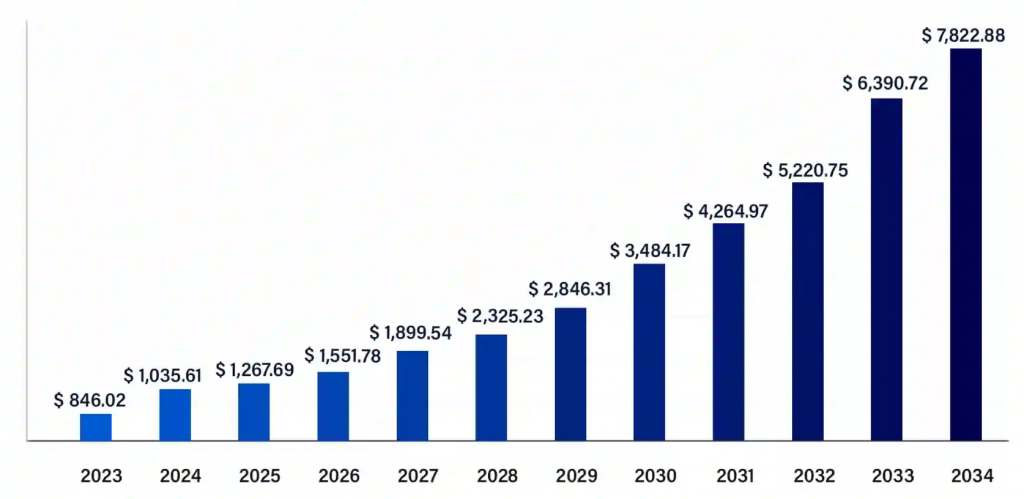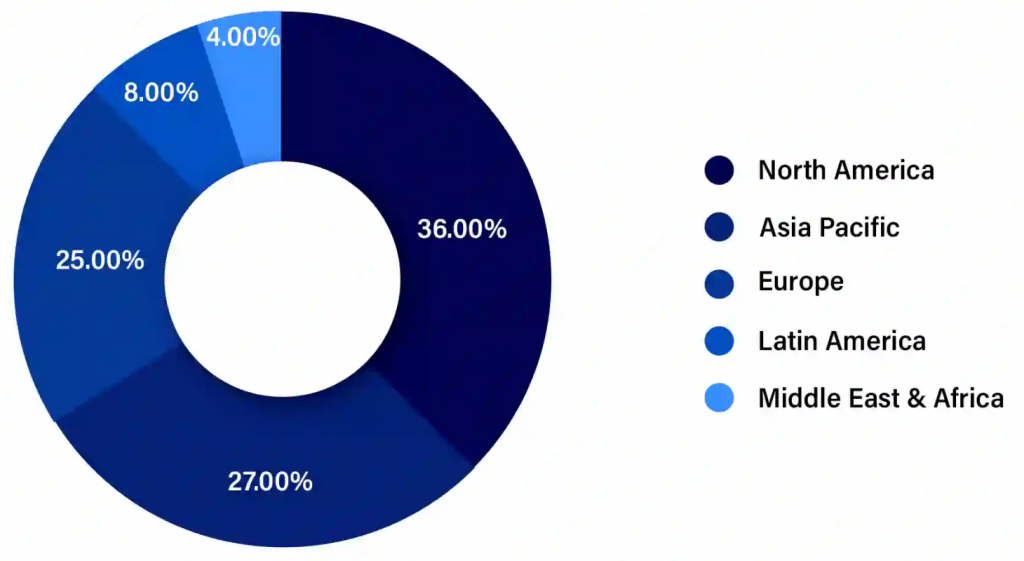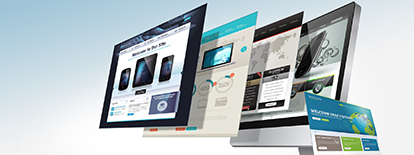We are living in the era of digitalization. The world around us is quickly changing. And it doesn’t look like it used to even a few decades ago. We detect rather profound transformations if we start considering different domains and markets.
The history of advertising in this or that form began many centuries ago. However, AdTech is a comparatively new branch. The first-ever form of programmatic advertising, such as a banner ad, appeared only in the 1990s. Though not much time has passed since then, the AdTech landscape has changed a lot.
Advertising technology has gone much beyond simple online ads. AdTech companies play a crucial role in the digital advertising ecosystem by offering sophisticated solutions for advertisers and publishers. Modern tools help enable, optimize, and automate digital advertising buying, selling, and delivery. Advertising technology is greatly shaping the marketing world in general. That’s why it is so crucial for businesses not to miss everything happening in the ad tech ecosystem these days.
In this article, we talk about the current state of this industry and the best AdTech companies that make the most significant contribution to its growth and development.
Ad Tech Landscape: What’s Going on Today?
The global AdTech market's volume reached $846.02 billion in 2023. In 2024, it is expected to hit $1,035.61 billion. These figures are pretty impressive. But longer-term forecasts look even more optimistic. By 2034, the market size has a chance to be around $7,822.88 billion. It will expand at a CAGR of 22.41% over the forecast period from 2024 to 2034.
Adtech Market Size 2023 to 2034 (USD Billion)
As for the share of different regional markets, North America is a leader here. The North American AdTech market achieved a volume of $304.57 billion in 2023, meaning it has accumulated a 36% revenue share. However, another region was named the fastest-growing one for the forecast period. It is Asia Pacific. Experts predict that this part of the world will be able to boast the biggest AdTech companies in the coming years.
Adtech Market Share, By Region, 2023 (%)
The further adoption of e-commerce and retail media, integration of advanced technologies, and new advertising formats are among the strongest boosters of the growth of the global AdTech industry.
Adtech Landscape: Key Trends Shaping the Industry
The Ad Tech market is rather dynamic. Adtech companies in USA and worldwide quickly react to new tech and business tendencies, which explains all the changes that occur today.
Let’s consider the most essential AdTech trends that can be identified now.
- Shift towards first-party data. The increasing concerns around data privacy and security are pushing governments to implement more serious privacy regulations, like GDPR and CCPA. Moreover, over recent years, there have been a lot of talks about the deprecation of third-party cookies. Even though these cookies are still here to stay, top ad tech companies focus more on first-party data. Namely, the information that can be collected directly from users will likely start playing the most important role for advertisers. Today, this data is becoming a cornerstone of targeted advertising. This approach makes relationships between companies and customers more transparent and open.
- Enhanced personalization. AI and ML are driving more sophisticated audience segmentation and personalized ad experiences. These technologies can quickly analyze vast amounts of data, predict user behavior and tailor ads in real time, which helps to improve engagement and conversion rates. The benefits of personalization and new opportunities it offers drive the demand for such solutions and the growth of AI AdTech companies.
- Expansion of the programmatic approach. Programmatic advertising is expanding beyond traditional digital channels and is entering CTV and OTT platforms. Today, more and more consumers prefer streaming services to traditional TV channels. As a result, advertisers can leverage programmatic to reach these audiences with targeted ads. Moreover, programmatic is also making inroads into the audio format, including podcasts and music streaming services.
- Immersive ad formats. AR and VR technologies are quickly developing, and with the progress made in this sphere, immersive ad formats are becoming more common. These formats offer highly engaging experiences and allow users to interact with products in virtual environments.
- Ad fraud prevention. Private and public AdTech companies are growing interested in blockchain to ensure transparency and authenticity in ad transactions. Blockchain can help verify the origin of ad impressions and clicks, reducing the chances of fraud. It’s also important to mention that the use of sophisticated algorithms and AI to detect fraudulent activity is also on the rise. These tools can identify suspicious patterns, bot traffic, and other dishonest behaviors.
- Consolidation and integration in the AdTech landscape. The market is experiencing significant consolidation. The biggest AdTech companies acquire smaller firms to enhance their technology stacks. This trend is leading to more integrated platforms that offer end-to-end solutions. There is also a push towards unified AdTech platforms. Such solutions combine various functions into a single ecosystem. Such changes are rather beneficial for advertisers, as thanks to them, many processes are simplified. Integrated platforms provide a seamless experience for managing campaigns across multiple channels.
- SaaS in AdTech. AdTech SaaS companies offer customizable solutions that allow advertisers to tailor the tools and features to their specific needs. The popularity of such products among advertisers, agencies, and publishers is continuously growing. This can be explained by the fact that they cater to businesses of all sizes and provide them with the flexibility to adapt to changing market conditions. These solutions are hosted on remote servers and accessed via the Internet. This allows users to manage and execute advertising campaigns without installing software on local computers.
- Transparency in CSR (corporate social responsibility) initiatives. Consumers are increasingly looking for brands that stand for something beyond just their products. AdTech makes it possible to promote purpose-driven advertising, where ads communicate a brand’s commitment to social and environmental causes.
- Influencer marketing and AdTech integration. Influencer marketing is a rather new trend that is boosted by the growing role of social media in our lives. Given the growing demand for this type of marketing services, nowadays top AdTech companies in the world are looking for the most efficient solutions for this domain. Already now AdTech is increasingly being used to automate and scale influencer marketing campaigns. We can observe the introduction of platforms that connect brands with influencers, automate the content creation process, and successfully measure the impact of these campaigns.
- Increased focus on sustainability. Today consumers have become more environmentally conscious. Under the influence of this trend, advertisers need to adopt more sustainable practices. This includes reducing the carbon footprint of digital ads and ensuring that ad practices align with broader sustainability goals. Some companies are starting to offset the environmental impact of their digital advertising campaigns. For example, some of them invest in carbon offset projects, such as reforestation or renewable energy initiatives.

That’s exactly what we talked about in one of our articles.
The Best AdTech Companies: Which of Them Deserve Your Attention?
Want to better understand what is happening in the industry and what solutions are available to advertisers and publishers today? To do this, it’s worth analyzing the list of AdTech companies that have already gained excellent reputation in the market. Let’s consider different categories of adtech solutions and the companies behind them.
Supply-side platforms (SSP)
Supply-side platforms are used by publishers (for example, website owners, app developers, and content creators) to manage, sell, and optimize their available ad inventory. SSPs help them to do it in an automated and efficient manner. With the help of such platforms, publishers have the possibility to connect their inventory to multiple ad exchanges, demand-side platforms (DSPs), and networks. As a result, they can expose it to a broader range of potential advertisers without any manual intervention.
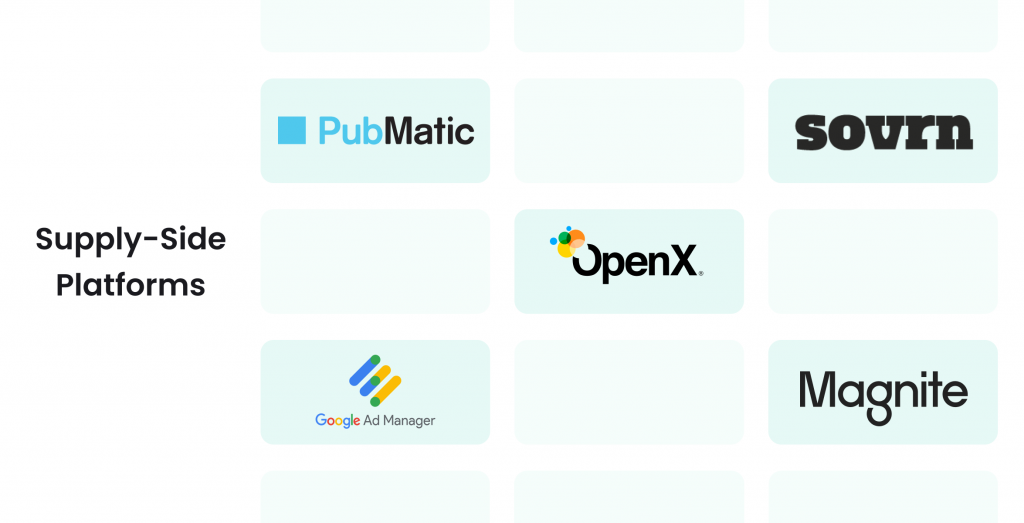
Pubmatic
It is one of the best-known SSPs in the market today. It allows independent publishers to take control over their digital advertising and successfully grow it. It helps marketers improve monetization by increasing their reach to target audiences across a wide range of ad platforms and formats.
OpenX
This programmatic ad tech company provides publishers with access to such important features as dynamic real-time bidding (RTB), precise inventory management, and advanced data analytics. Thanks to this, publishers who use this SSP can leverage enhanced data-driven decision-making and optimized ad placements.
Magnite
Among other best ad tech companies that offer supply-side platforms, we should name Magnite. This name became known in 2020, after the merger of two major SSPs - Telaria and Rubicon Project. Since that time, Magnite has made four successful acquisitions across AdTech and Martech domains. The new side-supply platform makes it possible to strengthen control over the process of selling their ad inventory with the help of Private Marketplaces (PMP), Auction Package, and Programmatic Guaranteed (PG) capabilities.
Sovrn
This platform is known as one of the most reliable ones in the industry. It boasts popularity among publishers who are looking for a new way to increase programmatic revenue and improve their optimized ad monetization. It has rich functionality. For example, the platform offers audience insights and can simplify a lot of tasks for users via its OneTag feature.
Google Ad Manager
Google is known for a wide range of digital tools for advertising and its SSP is one of them. It provides publishers with access to multiple ad exchanges and networks, such as Google’s AdSense, Ad Exchange, third-party networks, and third-party exchanges. Thanks to all the provided opportunities, publishers can significantly increase their potential revenue.
Our professionals have all the required skills and experience for building such platforms from scratch and modernizing the existing ones.
Demand-side platforms (DSP)
Such platforms let advertisers, agencies, and marketers automate the process of purchasing digital ad space across multiple channels in a single place. Advertisers have the possibility to submit their ad creatives to DSPs and further pay these platforms for impressions. Such platforms play an essential role in the modern AdTech ecosystem as they help brands reach their desired audiences quickly and easily.
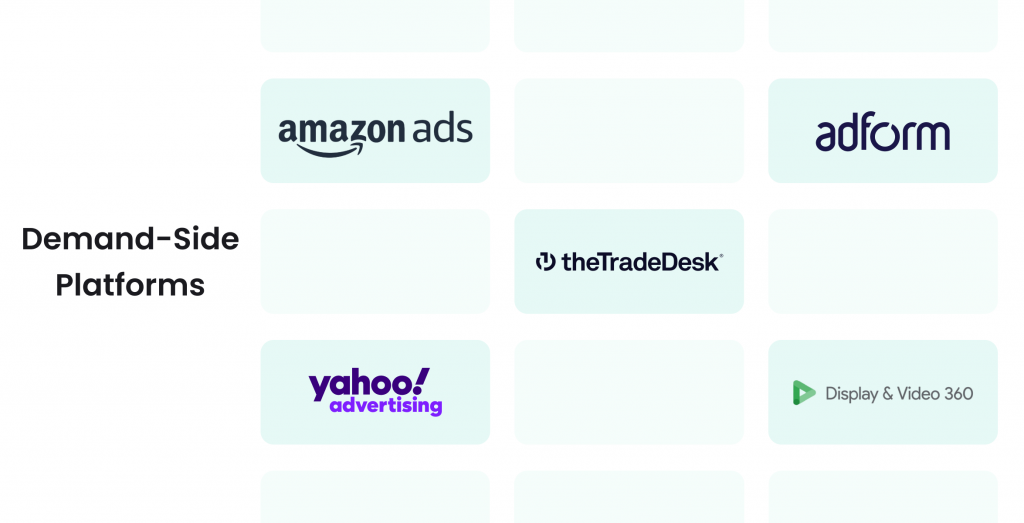
Amazon DSP
This demand-side platform allows users to programmatically buy ads that will reach different target groups on and off Amazon. The platform provides advertisers with high-quality measure results and insights into ad performance to efficiently plan their marketing strategy without extra expenses.
Yahoo DSP
Yahoo is next on our list of the best ad tech companies. Its DSP is known for a wide range of tools, solutions, and services that can offer businesses absolutely new digital marketing opportunities. The platform is powered by an AI engine that streamlines and facilitates the process of ad buying and makes all related efforts much more effective.
Display & Video 360 by Google
This platform helps businesses successfully execute their unique digital ad campaigns. With its tools, teams can design creatives, purchase inventory, and work with audience data. Users of this DSP can leverage a high level of transparency as they can always view how their budgets are spent and where their ads are running at any moment.
Adform
This DSP is enriched with a wide range of helpful features and benefits that can greatly increase the profitability of ad campaigns. It allows advertisers to reach their audience via the most demanded channels and formats, such as mobile and in-app ads, video and display digital ads, CTV, and OTT. The platform can generate reports both on demand and in real time, which makes working with the available insights more convenient.
The Trade Desk
Today, this DSP has a network of more than 200 publishing partners, including prominent names such as Spotify, Hulu, FOX, Disney, and ESPN. With its help, advertisers can successfully launch ad campaigns for different screens and devices. Such an approach can ensure broad reach and the highest results. RTB, PMP, Programmatic Guaranteed, and direct deals are among the features provided by the platforms.
Or maybe you have plans to launch your own self-serve ad platform for advertisers? Our AdTech software development team will be always ready to transform your ideas into real products.
Ad exchanges
While discussing top AdTech companies, it’s also worth mentioning ad exchanges. Such platforms help facilitate programmatic ad deals. They allow publishers and advertisers to sell and buy ad inventory directly. This can be done via real-time bidding.This model makes it possible to eliminate the participation of intermediaries that are traditionally included in such transactions. Ad exchanges ensure high flexibility and transparency for both publishers and advertisers.
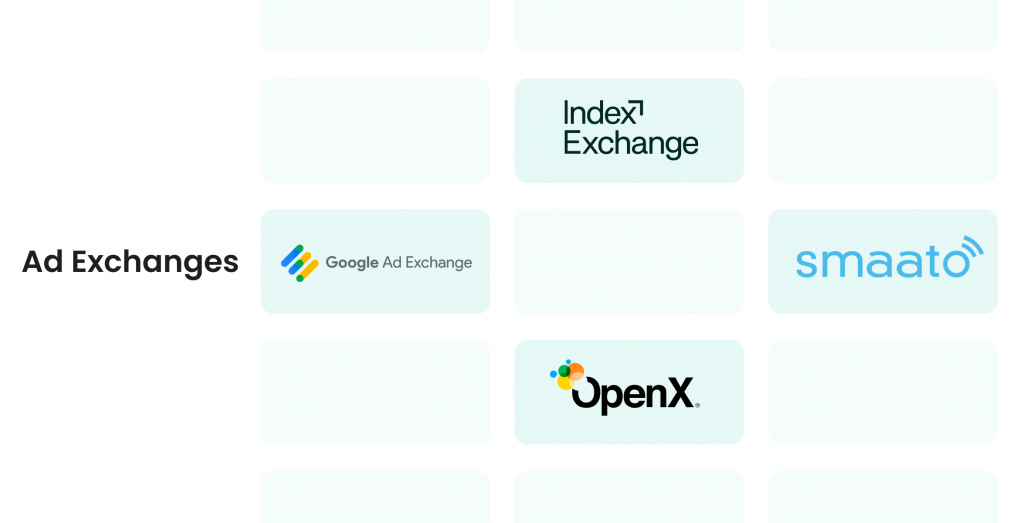
Google Ad Exchange
This is one of the most well-known marketplaces where selling and buying digital advertising space in real-time is possible. Such transactions can be executed via private and direct auctions. Unlike many ad exchanges that sell clicks, this one is focused on selling impressions. Although Google manages the platform, publishers are not limited to Google Ads advertisers only. They can get access to other ad networks all over the world as well.
OpenX
This platform is well-positioned as a high-quality programmatic ad marketplace. It supports direct publisher relationships and offers innovative buying models. It has built an outstanding reputation as the largest independent ad exchange. Its network includes 1,200+ premium publishers, 50,000+ mobile applications, more than 34,000 advertisers, and over 400 buyers based in 190 countries worldwide. This ad exchange supports all screens and formats and opens instant access to global, US, and hyper-local inventory.
Index Exchange
This is an omnichannel marketplace known for its transparency and reliability for users. It offers marketers a wide range of possibilities to reach different groups of consumers through any ad format on any device. The list of available ad formats includes video, banner, connected TV (CTV), and native ads.
Smaato (SMX)
This name is a good example of mobile adtech companies. SMX is an OpenRTB and ad network mediation advertising exchange for mobile applications and websites. Thanks to the provided real-time bidding capacities, it is possible to set floor prices of ad placements to let demand partners place bids for the final price. The entire process from the start of triggering an ad request to the ad placement takes around 200 milliseconds. And what is more important, relatively little effort is required from the side of publishers. They just need to have an application and set their ad placement prices.
Ad servers
Ad servers are systems that perform functions of a centralized platform for ad management. They are designed to make instant decisions on the most appropriate ads to be shown on a publisher's website or application. In such a way, they greatly facilitate and enhance the process of displaying ads to users. Advertisers can rely on ad servers to manage their campaigns. They can upload ads, indicate the desired targeting options, set budgets, and schedule when and where their ads should be displayed. Moreover, ad servers can efficiently track ads' performance based on metrics such as impressions, clicks, conversions, and other KPIs. Results can be further presented in the form of reports.
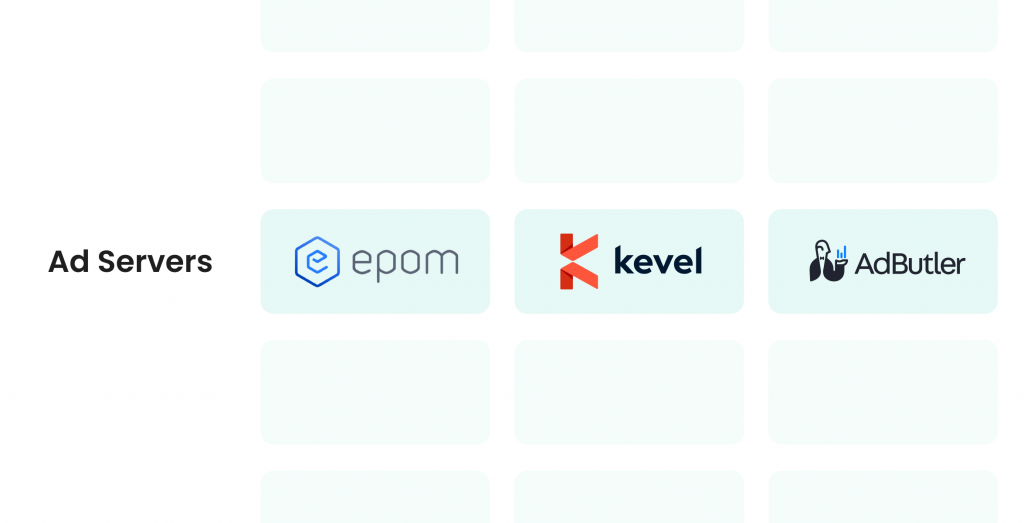
Epom Ad Server
AdTech software allows businesses to manage ad campaigns, leverage automated optimization, and set up their advertising ecosystem. It smoothly facilitates the management of affiliate marketing and online advertising campaigns for ad networks and brands. Users can have just a single account to work with these two options. Today, Epom boasts continuously growing popularity as it provides all the required functionality to launch, manage, and control ad campaigns of any scale.
Kevel Ad Server
Kevel offers a rich suite of ad serving APIs. They are smartly designed to enhance campaign management, reporting, and ad decision-making. The Ad Server provides access to the Kevel Forecast feature. It can demonstrate the potential performance of your ad against future and existing campaigns. Moreover, this solution also lets users power their ads with their custom machine learning segments, as well as ready-made targeting options based on geo, category, and keyword.
AdButler
This is an ad server designed specifically to manage native ads. It is positioned as a one-stop-shop solution for online retailers, digital marketplaces, newspapers, user-generated content, directories, and more. It also helps to create engaging ad experiences with custom and ready-to-use ad template formats. Multiple server locations and unique server design ensure very fast ad delivery. The majority of ads can be successfully delivered in milliseconds.
Data management platforms (DMPs)
These are centralized systems intended for collecting, organizing, and analyzing vast amounts of data from various sources. The processed data is used to create detailed audience segments for targeted advertising and marketing efforts. For ad-related purposes, DMPs may work with information regarding user demographics, people’s engagement with ads, on-site or in-app behavior, as well as many other things.
This will allow you to have full control over technology and audience data instead of relying on vendors.
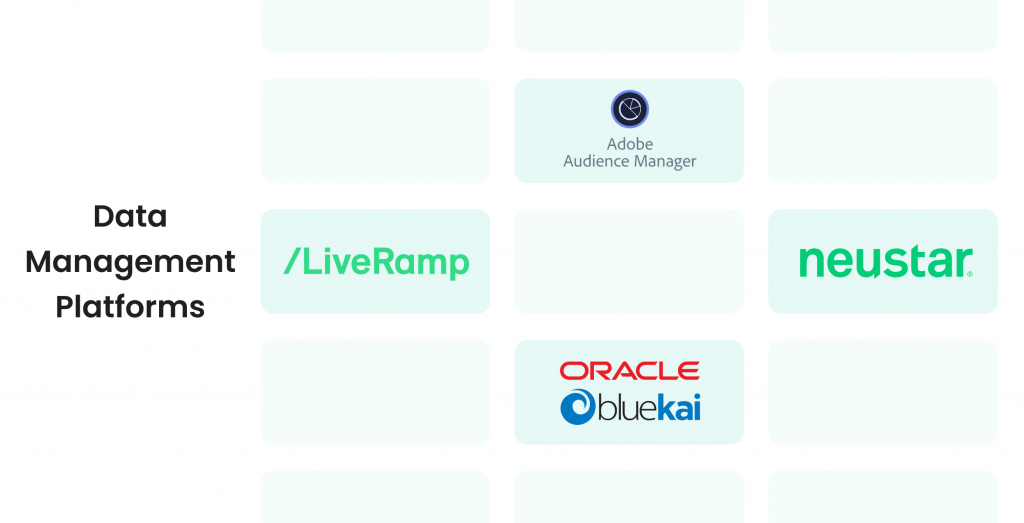
Liveramp
It is one of the AdTech companies that offer a data collaboration platform. This DMP helps businesses increase the value of their data, get a deeper understanding of their customers, and reach new target groups via segmentation and lookalike modeling. LiveRamp operates a highly dynamic marketplace for buying and selling third-party data and discovering new opportunities for establishing collaborations for second-party data exchange.
Adobe Audience Manager
Audience Manager doesn't focus on media-based solutions as the majority of data management platforms. Instead, it is known as a next-generation DMP that works with multiple data sources and advanced experience-oriented technologies. This helps it better determine and address the audience segments with the highest value for businesses.
Oracle BlueKai Data Management Platform
This DMP helps users efficiently organize, analyze, and activate their data for the needs of online, offline, and mobile ad and marketing campaigns. The platform allows companies to assemble data from as many sources as they can make use of. It is continuously refining the chosen target audiences in order to ensure that all running campaigns are built based on the most relevant information.
Neustar IDMP
This identity data management platform enables organizations to assemble, enrich, and work with all available identity data from a single source of truth. The platform is a centralized repository of identity data that unites first-, second-, and third-party data with consumer behaviors and attributes. Thanks to a better understanding of their audiences marketers and advertisers can deliver more relevant experiences to customers and create more relevant business strategies.
Customer data platforms (CDP)
Customer data platforms collect first-party data and personally identifiable information (PII) to enhance the efficiency of marketing communications. With such platforms, companies can create profiles of their existing clients, which can be applied to tracking their engagement via changes in such metrics as conversion and retention rates. The significance of CDPs is increasing in the current realities when third-party cookies are associated with a row of privacy-related concerns.
The description of CDPs may seem quite similar to DMPs. With the current changes in data privacy regulations, the distinction is becoming rather blurred. Nevertheless, it’s worth highlighting that CDPs are focused on marketing, first-party data, and “known” clients. At the same time, DMPs concentrate on digital advertising, third-party data, and “unknown” customers.
How to choose the right platform? And do you need to select only one?
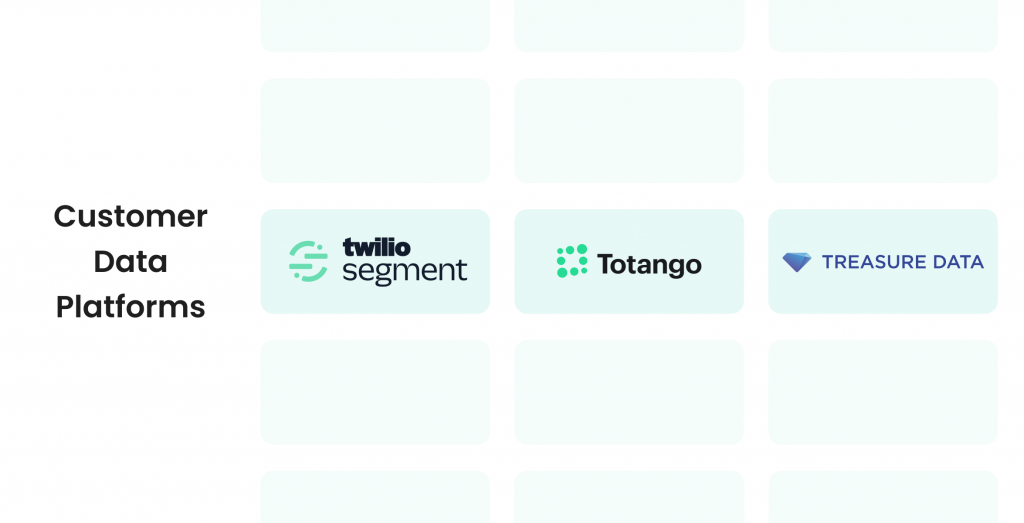
Twilio Segment
This CDP helps businesses create meaningful interactions based on valuable data insights to ensure better engagement. It collects, cleans, structures, and accumulates all business data in one place, allowing companies to better govern it, remove bad data, and use good data to design customer profiles.
Totango
This is an intelligent customer data platform that can seamlessly unite different pieces of customer information. Such an approach makes it possible to proactively track changes in customer preferences and needs, and, consequently, timely react to them. One of the main advantages of this platform is that it is able to work with any data, in any format. For example, it can connect financial data from Netsuite or Salesforce with support ticket status from Zendesk and satisfaction scores from feedback survey tools.
Treasure Data
It has a reputation as a leading AI-powered CDP for enterprises and large companies. The platform allows businesses to overcome such issues as data disconnect and data silos. It lets them fully leverage the benefits of having unified customer profiles built based on the history of interactions, real-time needs, and AI-powered predictive analytics.
Ad networks
These companies function as bridges between advertisers and websites ready to host advertisements. They aggregate ad supply from publishers and help match it with the existing advertiser’s demand. They simplify the ad buying process by offering advertisers access to a broad range of placements across different websites and apps, typically through a single interface. Many of the biggest AdTech companies offer ad networks and access to their ad servers in tandem, making such turnkey solutions more appealing for publishers.
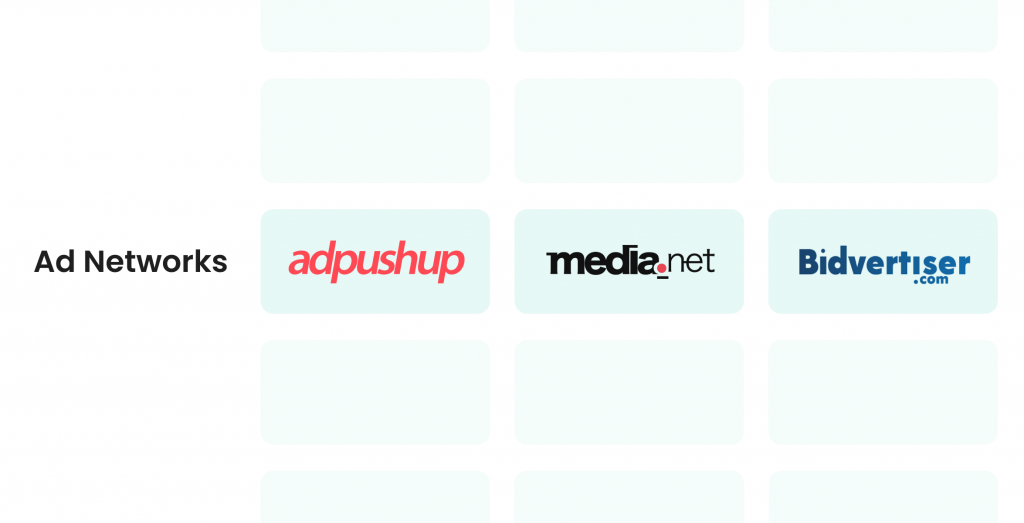
AdPushup
It is one of the leading display ad networks considered a publisher-focused platform designed to optimize revenue. It can become a good choice for publishers just starting to leverage ad monetization. The network offers a comprehensive suite of tools that are available in three pricing plans based on revenue sharing. Among the most highly demanded features, we should name managed header bidding, detailed revenue reports, ad optimization, and robust management capabilities.
Media.net
This is another well-known ad network on our list that provides access to high-quality contextual ad demand from the Yahoo! Bing Network. The platform seamlessly connects with various DSPs, DMPs, and other third-party services, which can ensure excellent rates for all publishers. Media.net relies on advanced ad technology like server-side ad insertion and real-time bidding. Thanks to this, it can deliver superior ad performance and impressive campaign results. The platform also incorporates robust ad safety protocols to eliminate the cases of ad fraud.
BidVertiser
This direct advertising network offers the most optimal match between advertisers and publishers. All the traffic sources offered are pre-screened and can successfully generate conversions for advertisers who have joined the network. The traffic is fully segmented, which means that companies can target their ads with the highest level of precision based on factors such as geo, devices, browsers, etc.
Agency trading desks (ATD)
Such trading desks can be defined as pieces of technology or sets of services provided by media agencies. These services are related directly to programmatic advertising campaigns, namely, to their planning, buying, launching, managing, running, and optimizing. For advertisers, it is often more feasible to turn to such services than manage their campaigns alone.
Today, the traditional agency business model is in jeopardy amid the growth of the major digital companies like Google. Nevertheless, this situation pushes them toward innovation and expanding their services with new offers. As a result, trading desks today are often just a small part of the entire range of services and solutions these companies provide.
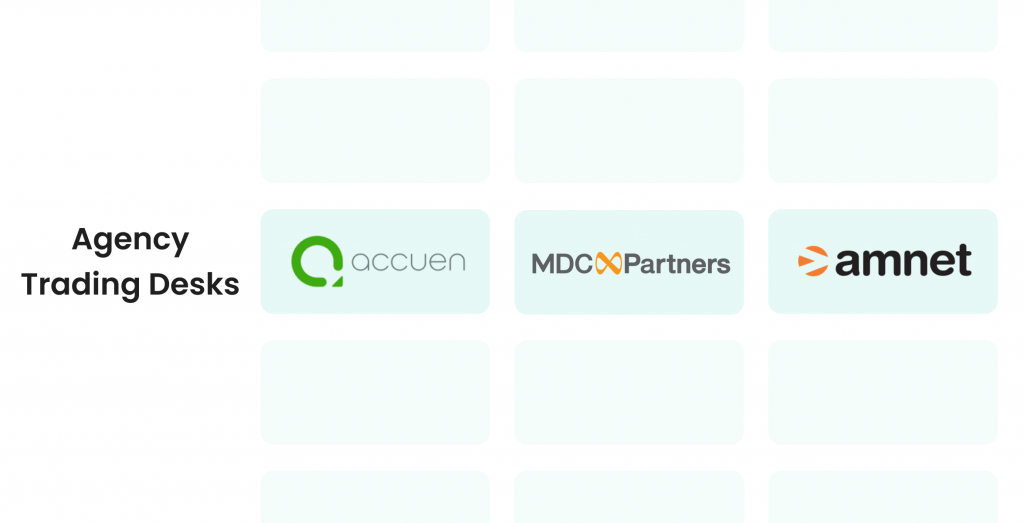
Accuen
Accuen is a programmatic ad agency part of Omnicom Media Group. It pioneered the industry's first open and flexible platform for programmatic media buying. Today, it operates in 60 countries, and its specialists can provide cutting-edge solutions across various channels to turn data into a powerful competitive advantage in media strategy.
MDC Partners
It is an advertising and marketing holding company. Its trading desk operates under various agency brands within the network. It mainly provides customized programmatic ad solutions that address niche markets and specific business requirements.
Amnet
It is Dentsu Aegis Network’s specialist programmatic group. It unites over 1,000 specialists in technology, media, and data who work at Dentsu’s agencies in 52 countries. The Amnet trading desk covers video, audio, DOOH, in-gaming, display, and social ads.
Full-stack AdTech platforms
Such platforms often function as one-stop solutions for publishers and advertisers, offering access to a full range of tools that could be needed in their work.
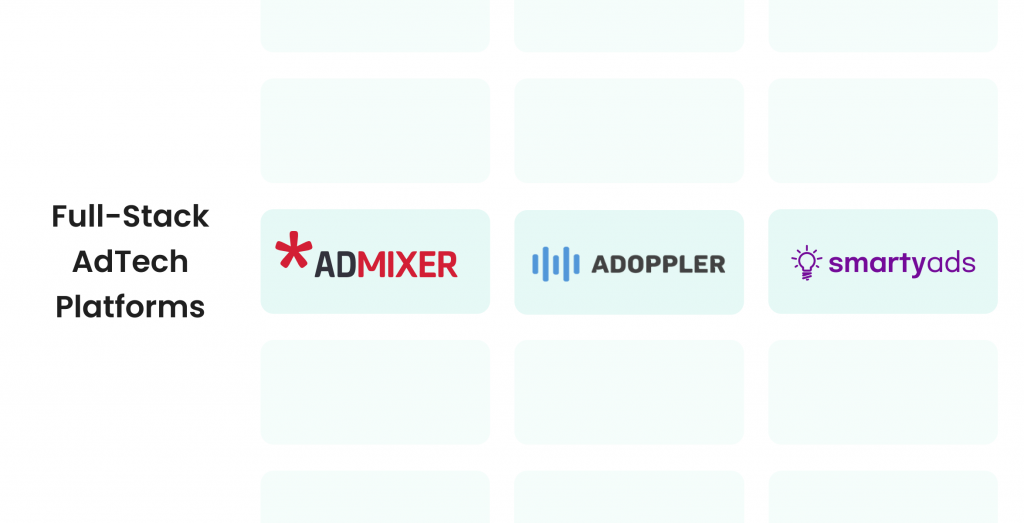
Adoppler
It is a holistic video monetization solution compatible with any platform and device. It allows users to enjoy the benefits of universal auctions and the best yield compared to obsolete waterfall ad serving. Among other important features, we can’t help but mention advanced tools for direct, programmatic, and third-party supply and demand management.
Adoppler unites the functionality of SSP, DSP, and ad exchange, as well as header bidding, transcoding, and delivery capabilities.
Moreover, publishers can leverage accurate data analytics and customizable aggregated reports based on different combinations of metrics and dimensions. This provides users with deep insights into their inventory sales performance.

We shared the project details in our success stories section.
Admixer
The company views its mission as supporting brands, publishers, and ad agencies in developing their businesses with the help of modern ad management solutions. Today, Admixer can boast a comprehensive set of digital products for both supply and demand sides. This allows the company to establish local ad ecosystems and work with niche audiences and inventory. Admixer has over 3500 clients in different corners of the world and almost 300 employees worldwide, while its network of global demand and supply partners includes more than 100 names.
SmartyAds
The company delivers full-stack solutions for advertising and monetization. It continuously builds and develops a transparent and safe ecosystem that allows brands to launch and manage their campaigns and maximize yields. It cooperates with digital advertisers, publishers, ad agencies, enterprises, and demand and supply partners worldwide and tries to revolutionize programmatic advertising with the power of AI, ML, and other emerging technologies.
AdTech development companies
When talking about the ad tech ecosystem, it is impossible not to mention companies that build, maintain, and modernize digital solutions to meet publishers' and advertisers' continuously changing needs. Such teams need not only a rich tech background and solid programming skills but also exclusive expertise in this particular domain.
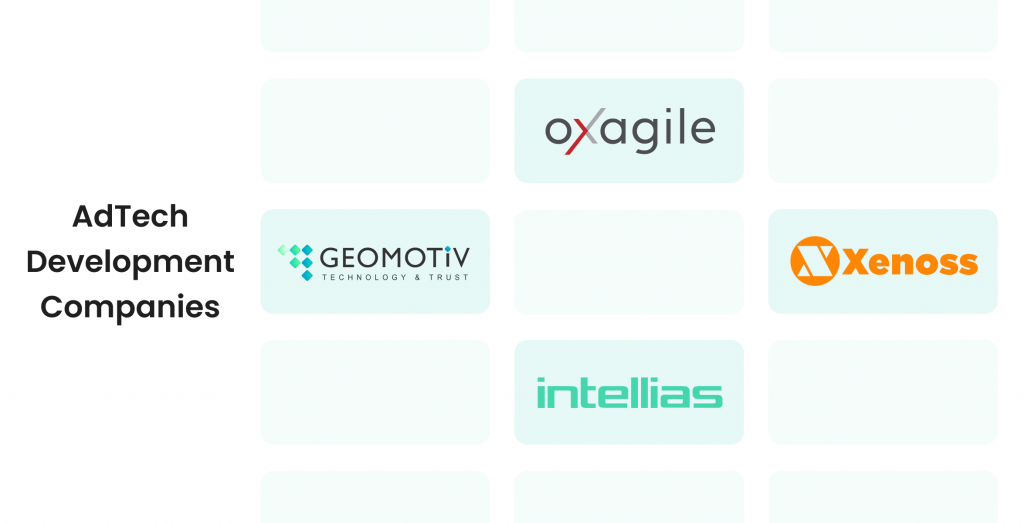
Geomotiv
For more than 14 years, Geomotiv has been delivering advanced software solutions for different industries, and AdTech is one field in which the company has the strongest expertise. The company builds reliable and innovative AdTech products that help users reach their business goals faster and with less effort. Among the clients that Geomotiv works with are AdTech companies, digital agencies, publishers, and various brands. The company offers different engagement models, making cooperation absolutely comfortable for customers with multiple needs.
With its approaches to building corporate culture and managing human resources, Geomotiv can be also viewed as one of the best AdTech companies to work for in Europe.
Oxagile
Oxagile has gained a reputation as a reliable advertising technology software development provider. Its team designs and implements AdTech solutions that can address a wide range of customers’ needs, including but not limited to targeting different audience groups, ad inventory monetization, and real-time bidding automation. The company provides both software development and consulting services in the AdTech domain.
Xenoss
This company specializes in MarTech and AdTech software development. For more than 15 years, it has successfully delivered AI-powered marketing, advertising, and media solutions. Its portfolio includes dozens of large-scale products for companies of different sizes, both startups and enterprises. Its custom software is used by numerous media and gaming firms, tech vendors, brands, publishers, and agencies.
Intellias
Intellias is a trusted AdTech development company. The team can successfully build custom AdTech solutions from scratch and enhance existing products with new features and third-party integrations. As part of its modernization services, Intellias can offer software reengineering and UI redesign. Moreover, the company can conduct MarTech and AdTech software quality and performance audits to identify potential areas for improvement.
Final Word
As we can see today, despite its comparatively short history, the AdTech industry is already quite mature. Its landscape is continuously expanding and welcoming new names and solutions. Like many other modern ecosystems, it is quite flexible and dynamic. And it greatly reflects the majority of the latest trends observed in the tech world.
The future of the ad tech ecosystem is shaped by a combination of technological advancements, regulatory pressure, and quickly changing consumer expectations. At the current moment, it is possible to presuppose that in the near future, the industry's development will concentrate on privacy, transparency, and ethical practices in advertising. Among the most promising technologies for the market, these days, experts name AI and blockchain.
Given the current state of the market, the demand for such products is expected to continue growing. If you want to enter this industry with your custom software or launch an AdTech solution for your company's needs, you should have a reliable development partner by your side. A professional team like Geomotiv can become an excellent choice for you.
Our specialists have rich expertise in this domain and will be able to build the most efficient digital solutions for ad monetization and revenue growth.
FAQ
We Help Unlock Answers to Your Questions
Such companies offer digital solutions that help manage, deliver, and optimize digital advertising campaigns. The provided tools automate ad buying and selling, track ad performance, and target audiences more effectively.
